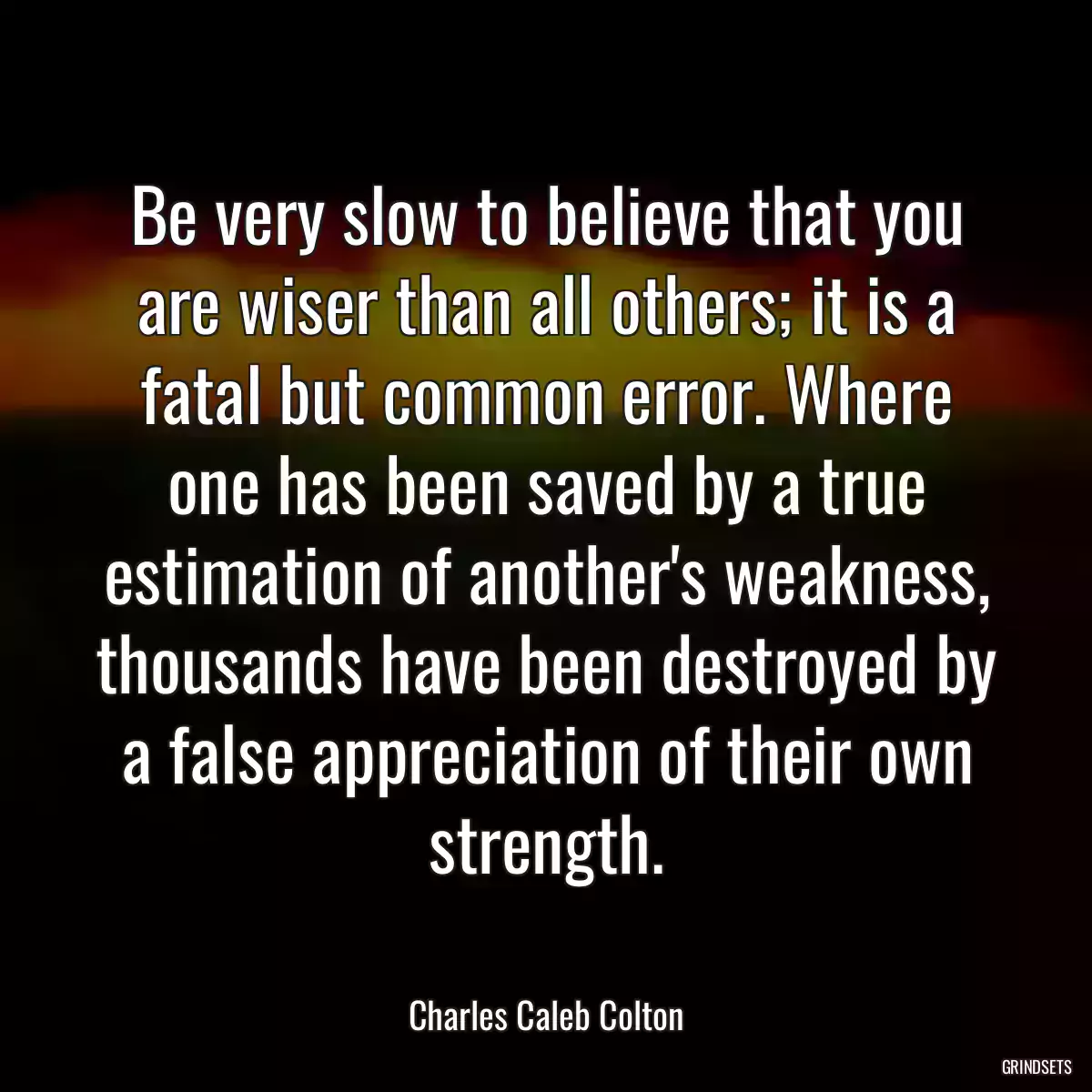
Quotes Charles Caleb Colton - page 5
Find dozens of Charles Caleb Colton with images to copy and share.

The seat of perfect contentment is in the head; for every individual is thoroughly satisfied with his own proportion of brains.
Many ... begin to make converts from motives of charity, but continue to do so from motives of pride. ... Charity is contented with exhortation and example, but pride is not to be so easily satisfied. ... Whenever we find ourselves more inclined to persecute than persuade, we may then be certain that our zeal has more of pride in it than of charity.
There are some who affect a want of affectation, and flatter themselves that they are above flattery; they are proud of being thought extremely humble, and would go round the world to punish those who thought them capable of revenge; they are so satisfied of the suavity of their own temper that they would quarrel with their dearest benefactor only for doubting it.
You may also like
Pride differs in many things from vanity, and by gradations that never blend, although they may be somewhat indistinguishable. Pride may perhaps be termed a too high opinion of ourselves founded on the overrating of certain qualities that we do actually possess; whereas vanity is more easily satisfied, and can extract a feeling of self-complacency from qualifications that are imaginary.
Philosophers have widely differed as to the seat of the soul, and St. Paul has told us that out of the heart proceed murmurings; but there can be no doubt that the seat of perfect contentment is in the head, for every individual is thoroughly satisfied with his own proportion of brains.
Time is the most subtle yet the most insatiable of depredators, and by appearing to take nothing is permitted to take all; nor can it be satisfied until it has stolen the world from us, and us from the world. It constantly flies, yet overcomes all things by flight; and although it is the present ally, it will be the future conqueror of death.
The upright, if he suffer calumny to move him, fears the tongue of man more than the eye of God.
When all moves equally (says Pascal), nothing seems to move as in a vessel under sail; and when all run by common consent into vice, none appear to do so. He that stops first, views as from a fixed point the horrible extravagance that transports the rest.

Those who worship gold in a world so corrupt as this we live in have at least one thing to plead in defense of their idolatry--the power of their idol. It is true that, like other idols, it can neither move, see, hear, feel, nor understand; but, unlike other idols, it has often communicated all these powers to those who had them not, and annihilated them in those who had. This idol can boast of two peculiarities; it is worshipped in all climates, without a single temple, and by all classes, without a single hypocrite.
Lord Bacon has compared those who move in higher spheres to those heavenly bodies in the firmament, which have much admiration, but little rest. And it is not necessary to invest a wise man with power to convince him that it is a garment bedizened with gold, which dazzles the beholder by its splendor, but oppresses the wearer by its weight.
Liberty will not descend to a people; a people must raise themselves to liberty; it is a blessing that must be earned before it can be enjoyed.
Tyrants have not yet discovered any chains that can fetter the mind.
No two things differ more than hurry and despatch. Hurry is the mark of a weak mind; despatch of a strong one.
Our actions must clothe us with an immortality loathsome or glorious.
The true motives of our actions, like the real pipes of an organ, are usually concealed; but the gilded and hollow pretext is pompously placed in the front for show.
Neutrality is no favorite with Providence, for we are so formed that it is scarcely possible for us to stand neuter in our hearts, although we may deem it prudent to appear so in our actions
Vice has more martyrs than virtue; and it often happens that men suffer more to be lost than to be saved.
You may also like

There are circumstances of peculiar difficulty and danger, where a mediocrity of talent is the most fatal quantum that a man can possibly possess. Had Charles the First and Louis the Sixteenth been more wise or more weak, more firm or more yielding, in either case they had both of them saved their heads.